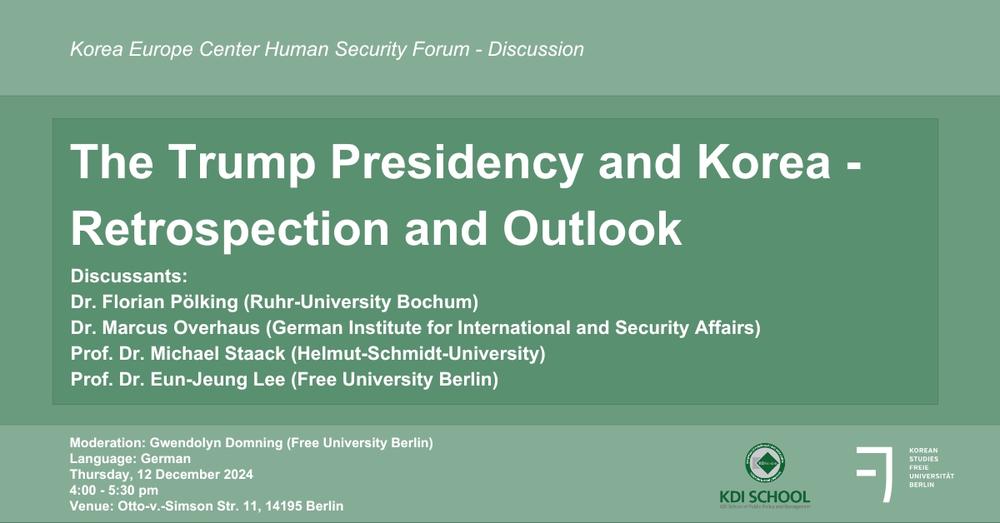The election of Donald Trump as president marked a potential turning point in U.S. foreign policy, with far-reaching implications for Korea. Recently commemorating the 70th anniversary of U.S.-Korea relations, South Korea has also become a key player in the evolving trilateral security framework with the U.S. and Japan under the Biden administration, further influencing the region's strategic landscape.
What developments lie ahead for this critical alliance amid ongoing regional and domestic challenges? This discussion seeks to reflect on pivotal moments in U.S.-Korea relations, offering insights into the alliance's current state and exploring its potential future trajectory in an increasingly dynamic geopolitical environment.
Discussants:
Prof. Dr. Eun-Jeung Lee :
Eun-Jeung Lee is Professor for Korean Studies at the Free University Berlin. She received her doctorate at University of Göttingen and her “Habilitation” at University of Halle. She taught at universities in Korea, Japan and Germany, is a member of the Berlin-Brandenburg Academy of Sciences and Humanities, was awarded the Order of Civil Merit (2019) by the Republic of Korea for her research and education activities in the field of unification and transformation and Mirok Lee Price (2013) for her contribution to German-Korean relations. Her research focuses are intercultural history of political ideas, Korean politics and culture. She has served as a Member of German-Korean Advisory Council for Foreign and Unification Policy (2014-2017), since 2020 is a member of German-Korean Consultation Committee for Unification. She was fellow of Alexander von Humboldt Foundation at the Institute for Political Science, University Halle, fellow of Japan Foundation at the Aoyama Gakuin University Tokyo.
Prof. Dr. Michael Staak:
Prof. Dr. Michael Staack was Co-Director of the Institute for International Politics at the Helmut Schmidt University in Hamburg, where he has served from 2006 until 2024. He is now Professor Emeritus. Michael Staack is a recognized expert in international relations, focusing on multilateral security, peace processes, and the Korean Peninsula, including participation in high-level strategic dialogues between Germany and South Korea. His academic career includes professorships at prestigious universities such as the Beijing Foreign Studies University and the China Foreign Affairs University. Prof. Staack has also been an advisor in international peace and security policy, contributing to projects on European security and multilateral arms control. His extensive academic leadership includes roles as Dean of the Faculty of Economics and Social Sciences at Helmut Schmidt University.
Dr. Marco Overhaus:
Dr. Marco Overhaus is a senior researcher in the Americas research division at the German Institute for International and Security Affairs (SWP), where he has worked since 2014. His expertise lies in U.S. defense and military policy, transatlantic defense cooperation, NATO, and U.S. security strategies in the Middle East and Indo-Pacific regions. He has also contributed to reshaping the European security order. Previously, he served as a policy advisor in the German Federal Foreign Office and held transatlantic fellowships at RAND Corporation in Washington, D.C., and the French Institute of International Relations (IFRI) in Paris. Dr. Overhaus holds a degree in Political Science from the University of Potsdam and was a Fulbright Scholar at the University of California, San Diego.
Dr. Florian Pölking:
Dr. Florian Pölking completed his doctorate in Korean Studies at Ruhr University Bochum in 2016, focusing on technical knowledge within the political and social systems of the 18th and 19th centuries. His research has since expanded to modern Korea, addressing topics such as memory, identity, and political culture. Between 2022 and 2024, he served as a guest lecturer at the Institute for Korean Studies, FU Berlin. His work comprises the fields of International Political Economy and East Asian Politics, with a focus on contemporary South Korea’s foreign policy and national identity. Currently, he is researching the socio-political and foreign policy aspects of the Jeju April 3rd Incident in a DFG-funded project.
Moderation: Gwendolyn Domning
Zeit & Ort
12.12.2024 | 16:00 s.t. - 17:30
Institut für Koreastudien, Otto-v.-Simson Str. 11, 14195 Berlin
Weitere Informationen
Gwendolyn Domning (g.domning (at) fu-berlin.de)

